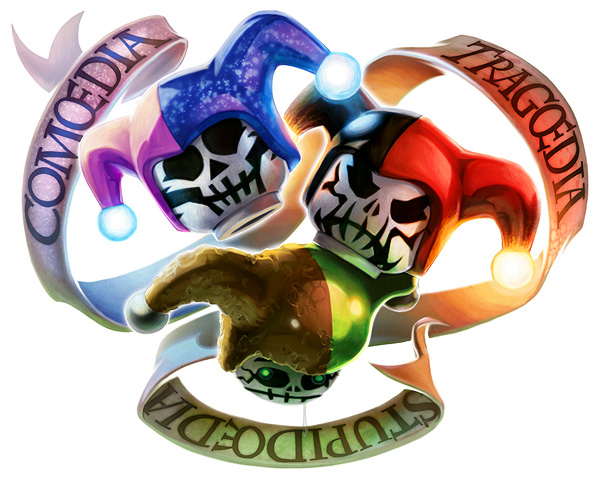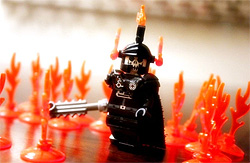|
Chapter
The Spirits of the Game
In BrikWars' Core Rules, players learn the dry mechanics of maneuvering minifigs around the tabletops to grisly deaths, without any attention given to why they should do so. It's easy for beginners to imagine that the point of wargaming is to secure objectives and win victories. Gamers with a little more experience know that winning and losing are just tools in a larger project to create fun - for themselves, and, depending on their personal benevolence, their friends as well. The most enlightened Humans serve a higher priority. Winning, losing, and having fun all have their place, but what matters is killing minifigs. Lots and lots of them. In MOC Combat, players are not only given the freedom to build and smash whatever new Creations their febrile imaginations churn out, but are invited to consider the deeper issues of Human enjoyment and brick-based eschatology and to plot their shared experience accordingly.
Creations and storylines in a BrikVerse have varying degrees of reality, determined by their Human's level of interest in them. This ontological clutch power is called Kanon. As much as minifigs love slaying enemies and looting bricks, true spoils of a BrikWar are the chance to be immortalized in Kanon. At a battle's end, whether due to victory, defeat, or just running out of time, Human players should pause to drink and feast and reflect on their minifigs' deeds. Notes or photos can be ignored; accuracy is beside the point. Reminisce over which characters, events, and creations were the most epic, and which outcomes were most important to the world and storyline. Sometimes this will include an acknowledgment of who, if anyone, won. More often, it will be a toast to the characters that failed their objectives most heroically. Raise a glass to the forces who ignored their nominal goals and managed to achieve something ridiculous and majestic in spite of them. Heap glory on the cat who jumped on the table and proved herself the deadliest combatant of all. It's up to the Humans to decide the larger consequences of the day's events, if any. Because Everyone's the Boss of Their Own Toys, each player has final say over the fates of their own factions, but they're free to put the details up to collaborative brainstorm, debate, and What I Say Goes rolls. They'll almost immediately forget the great majority of whatever they decide, much to the minifigs' chagrin, but the parts they remember become Kanon.
BrikWars takes place in a rigged BrikVerse, whose fundamental laws are set up to ensure that the most improbable thing that could possibly happen usually does. The ends obviate the means, and if the Humans need a medieval castle and breathable atmosphere to show up in an uncharted asteroid field in order to play out a battle of dragons versus starfighters, then that's exactly what happens. The forces of Koincidence put the castle where it needs to go, and its arrival requires no explanation, any more than does the invasion force of Non-Euclidean Space Ponies arriving two turns later. The Farce accomplishes this by putting the power of Koincidence into the hands of those least interested in using it responsibly. Specifically, whichever Humans are most opposed to the well-being of the minifigs involved. The Enemy Koincidence is a wonderful tool, but it must never be allowed to fall into the insufficiently wrong hands. Whether for Missed Shots, failed Feats, or any of BrikWars' other opportunities for things going wrong to Koincidentally go even wronger, players must only grant the power of Koincidence to their enemies. A player's enemies at any given moment tend to be obvious. If there's not another player currently trying to kill them, then their enemies are whichever players were trying to kill them most recently. Failing that, it's whichever players haven't started trying to kill them, but fully intend to. Players can't count their allies or defeated opponents as enemies. If a player doesn't have any enemies, they should immediately make some. 
The Triple Ossum: Comedy, Tragedy, and Stupidity
1. bone 2. the seed within a fruit 3. the kernel, nucleus, or heart from Latin os 'bone.' Ex: "Ossum pro ossis bellum!"  When the land cries out for Ossum, splinter incarnations of Warhead appear.
No minifig can eff the ineffable mind of a Human, no matter how many effs they give. But minifigs have learned that the more Ossum they can offer, the more likely they are to receive their Human's continued blessings of violence and destruction. Philosopher minifigs teach that Ossum is both the skull under the flesh and the seed in the fruit, and SpaceMan kultists fetishize it as a symbol of rebirth in annihilation. Destruction isn't Ossum if it's meaningless or sterile. Ossum is built up of vital and deadly risks taken on the knife edge between glory and death, forcing ever-greater escalations of Ossum in response. Osseologists calibrate their osseometers by a metric of minifig skulls. The skulls of the innocent, collected and piled into a tyrant's throne to oppress the weak and timid, are Ossum. The skull of Two-By-Two is an Ossum. Warhead's fiery skull is pure flaming Ossum. But in the larger sense, everything is Ossum. There is nothing in a minifig's reality that can't be put to the service of violence. Whatever can be coveted, whatever kindles a minifig's highest virtues of jealousy, hatred, lust, or rampaging mass hysteria, whatever inspires homicide or assists in its implementation, all contain seeds of Ossum that can be nursed into glorious conflict. |